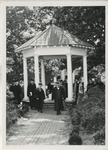Ricerca
Risultati della ricerca
Seleziona un immagine per l'avvio del slideshow

Olin T. Binkley Convocation 1960-1969
1 di 10

SEBTS Chapel - William R. Steininger October 27, 1965
2 di 10

SEBTS Chapel - William Claudius Strickland October 28, 1965
3 di 10

SEBTS Chapel - Student Coordinating Council November 4, 1965
4 di 10

SEBTS Chapel - Russell T. Cherry October 8, 1965
5 di 10

SEBTS Chapel - Robert C. McClernon October 15, 1965
6 di 10

SEBTS Chapel - H. Max Smith October 29, 1965
7 di 10

SEBTS Chapel - Max Eller October 13, 1965
8 di 10

SEBTS Chapel - John Terrill Wayland October 5, 1965
9 di 10

SEBTS Chapel - John M. Lewis October 26, 1965
10 di 10
